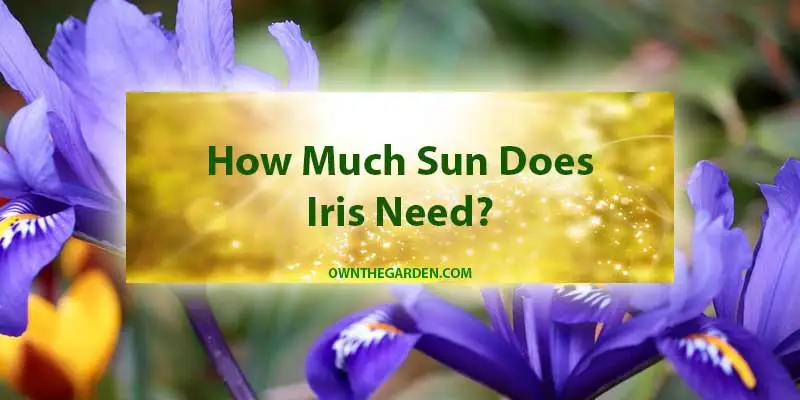Pass AI
The captivating beauty and diverse varieties of Iris have long charmed garden enthusiasts worldwide; indeed, it remains a perennial favorite. With its enchanting blooms–each one uniquely intricate–displaying a spectrum of colors: this flower truly is an aesthetic masterpiece. Understanding the sunlight requirements specific to irises in your garden becomes paramount if you seek to unlock their full potential. This article delves into the intriguing realm of irises, addressing a pivotal query: How much sunlight must an iris receive?
Understanding Iris Varieties:
To comprehend the diversity inherent in the Iris family–a member of the Iridaceae: we must initially explore its wide array of species and hybrids; these encompass various types such as Bearded, Siberian, Japanese and Dutch Irises. Each variety has its unique characteristics, but they share a common need for sunlight.
Sunlight Needs:
Generally, sun-loving irises require optimal sunlight for growth, blooming and overall health. The following breakdown elucidates the specific sunlight requirements of varying iris varieties:
1. Bearded Iris:
Full sunlight thrives the bearded iris, arguably the most renowned variety of irises. Typically, these plants demand a daily dose of at least 6 to 8 hours direct exposure to sunlight; therefore, planting them in an area abundant with such light guarantees robust growth and development: sturdy stems will materialize–vibrant blooms are inevitable results.
2. Siberian Iris:
Known for their adaptability to a variety of sunlight conditions, Siberian irises excel particularly when planted in full sunlight; however, they can also tolerate partial shade. For optimal blooming, aim to offer these irises–at the minimum–four to six hours of direct sunlight daily.
3. Japanese Iris:
When it comes to sunlight, Japanese irises exhibit a slight demanding nature: they prefer full exposure–however, partial shade remains tolerable. To elicit their vigorous growth and prolific flowering; direct them towards an optimum of six to eight hours of daily sunlight.
4. Dutch Iris:
Also thriving in full sunlight, Dutch irises are sun-loving plants. Bulbs of these produce stunning and colorful blooms; their performance peaks when they find themselves planted in a location that is generously bathed with ample sunlight.
Why Does Iris Love the Sun?
1. Blooming Potential:
The blooming process in irises necessitates adequate sunlight: this triggers it. The production of chlorophyll–the green pigment vital for photosynthesis–is fueled by sunlight-derived energy; consequently, robust flower bud development is supported.
2. Sturdy Stems and Foliage:
Promoting strong and sturdy stems in irises: that’s the pivotal role sunlight plays. This importance amplifies for tall varieties–like Bearded Iris, which can boast substantial flower spikes. Furthermore, ample sunlight directly augments foliage health and vigor.
3. Disease Prevention:
When exposed to ample sunlight, irises demonstrate a decreased susceptibility to diseases like fungal infections. Optimal air circulation and sunlight assist in maintaining plant dryness, thereby preventing the growth of conditions that foster disease development.
Tips for Providing Optimal Sunlight:
1. Select the Right Location:
Select a planting location for your irises: it should receive an optimal amount of sunlight tailored to the specific variety. Take care – ensuring excellent drainage is crucial; waterlogging can jeopardize iris health significantly.
2. Soil Quality:
Well-draining soil is the preference of irises; contributing to the overall health of these plants involves amending the soil with organic matter–ensuring proper drainage plays a crucial role in this process.
3. Mulching:
By applying a layer of mulch around iris plants, you can help the soil retain moisture and regulate temperature; however, exercise caution – excessive moisture retention may occur if you mulch too close to the rhizomes.
4. Divide and Conquer:
Dividing iris clumps periodically not only rejuvenates the plants; it also enhances sunlight penetration to their rhizomes–a practice that yields particular benefits for Bearded Irises.
Challenges and Solutions:
1. Excessive Shade:
Providing the recommended hours of sunlight in gardens with limited sunlight presents a challenge: one might need to strategically manage nearby trees or plants through selective pruning–thus allowing more direct exposure for the iris bed.
2. Overexposure to Sun:
Irises thrive in sunlight, yet excessive exposure to intense afternoon sun in hotter climates can induce stress. To safeguard the plants during peak heat, you should either consider providing a measure of afternoon shade or opt for planting them in locations that receive filtered sunlight.
Conclusion:
Understanding the sunlight requirements of irises is indeed crucial for optimizing their potential in your garden; this involves being captivated by the elegant Bearded Iris or enchanted with the delicate charm of Japanese Iris. It is essential to provide an appropriate amount–not too much and not too little–of sunlight: a balance that guarantees health and vibrancy. Embrace diversity within the iris family, customize your care approach according to each specific variety’s needs – then observe how these majestic blooms bestow their breathtaking presence upon your garden. Ensure your iris garden flourishes and stands as a testament to these remarkable flowers’ timeless allure by striking the perfect balance of sunlight, soil care, and attention.


